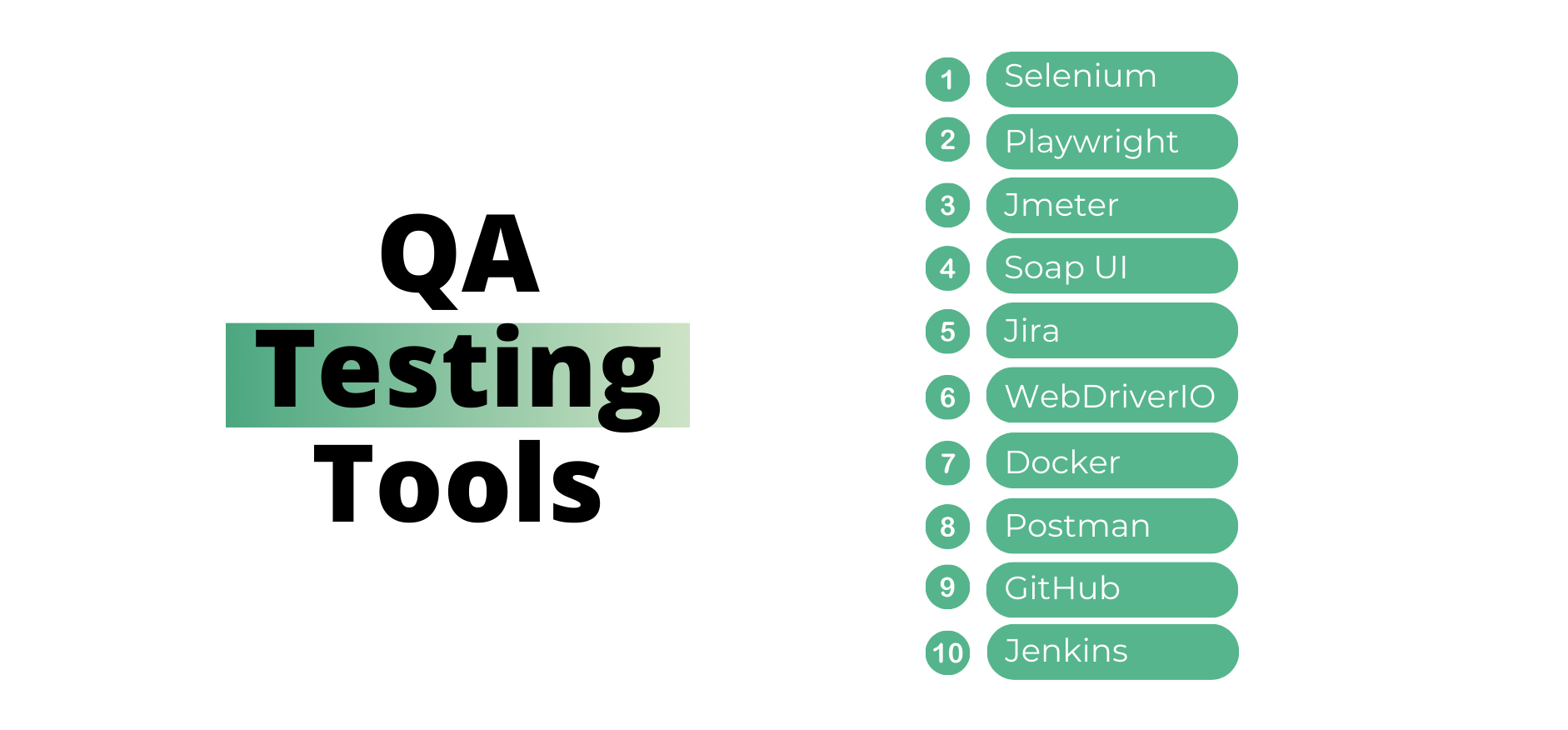Adequate quality assurance (QA) is essential nowadays in the fast-paced world of software development. The QA testing tools market continues to shift as 2024 advances. It offers creative ways to guarantee a seamless distribution of premium software. Now, what makes these tools unique? In the software testing world, they are equivalent to golden devices.
This blog will explore the QA testing tools that make software testing dependable and enjoyable. Ultimately, you will have the tools to produce flawless software in 2024. It's time to take advantage of the potential of software testing tools and establish yourself in the tech industry!

Why Is it Important to choose correctly the Software QA Testing tools?
Make a short introduction to the following list
- Cost Savings: Spending money on the right QA automation tools can save costs over time. You can save resources by employing automated testing tools, as they help to reduce the need for manual tests. Although buying and employing testing tools has an upfront cost, there can be a significant reward on investment over time.
- Comprehensive Testing: It is essential to thoroughly test all software components to significantly reduce the likelihood of errors or defects. This can be achieved using the software QA tools to provide complete testing coverage.
- Scalability: In most businesses, the software’s size increases as more features are added to the environment. So, the software testing tools need to be able to manage the workloads and change with the project needs. It is also crucial to check the technological stack of the testing tool. It means whether the tool can integrate seamlessly with your technological stack. It may include programming languages, cloud services, or application architectures.
- Supports Various Testing Types: Various software needs a variety of testing techniques. This may include UI testing for end-user interaction. Performing security tests to uncover hidden vulnerabilities and performance testing to check the reliability of the software. So, it is important to employ and select the software QA tools capable of doing various tests.
List of the Best 10 QA Testing Tools
Let’s review some of the best QA testing tools to consider in 2024:
1. Selenium
Selenium is a popular open-source web automation testing platform compatible with various web browsers and programming languages, making it accessible to a broad spectrum of programmers. However, Selenium by itself is not sufficient to test desktop or mobile applications and needs to be integrated with other frameworks to enable this functionality.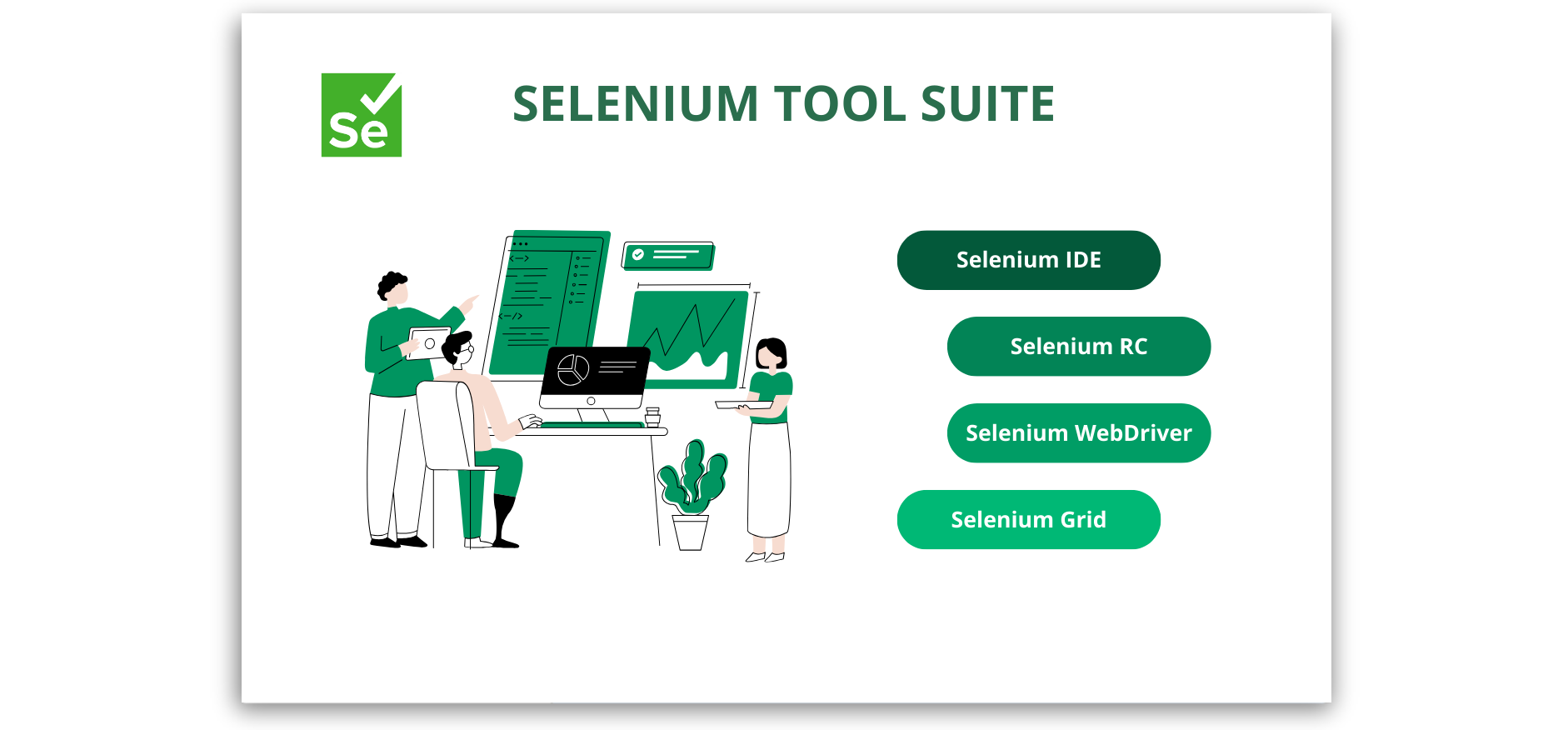 Features
Features
- Selenium IDE: An add-on to a browser, for record-and-playback testing.
- Selenium Grid: Allows for parallel test execution across multiple machines and browsers.
- It provides flexibility in building test scripts and can be enhanced with numerous plugins.
- It has upgraded WebDriver, as have Selenium Grid and additional window management capabilities.
- Extensibility: To work with third-party plug-ins and frameworks like TestNG, JUnit, and Cucumber to support many other modules.
Read more in our Selenium Testing Software complete guide.
2. Playwright
Playwright is an open-source Node.js library designed to help developers automate web browser interactions. It offers a vast number of functionalities, supporting in fulfilling testing needs.
This offers rich sets of tools for browser automation and makes it very easy to test web applications across browsers and platforms. Also, it supports modern web features, ensuring the tests conducted are correct and reflect the real users’ experience.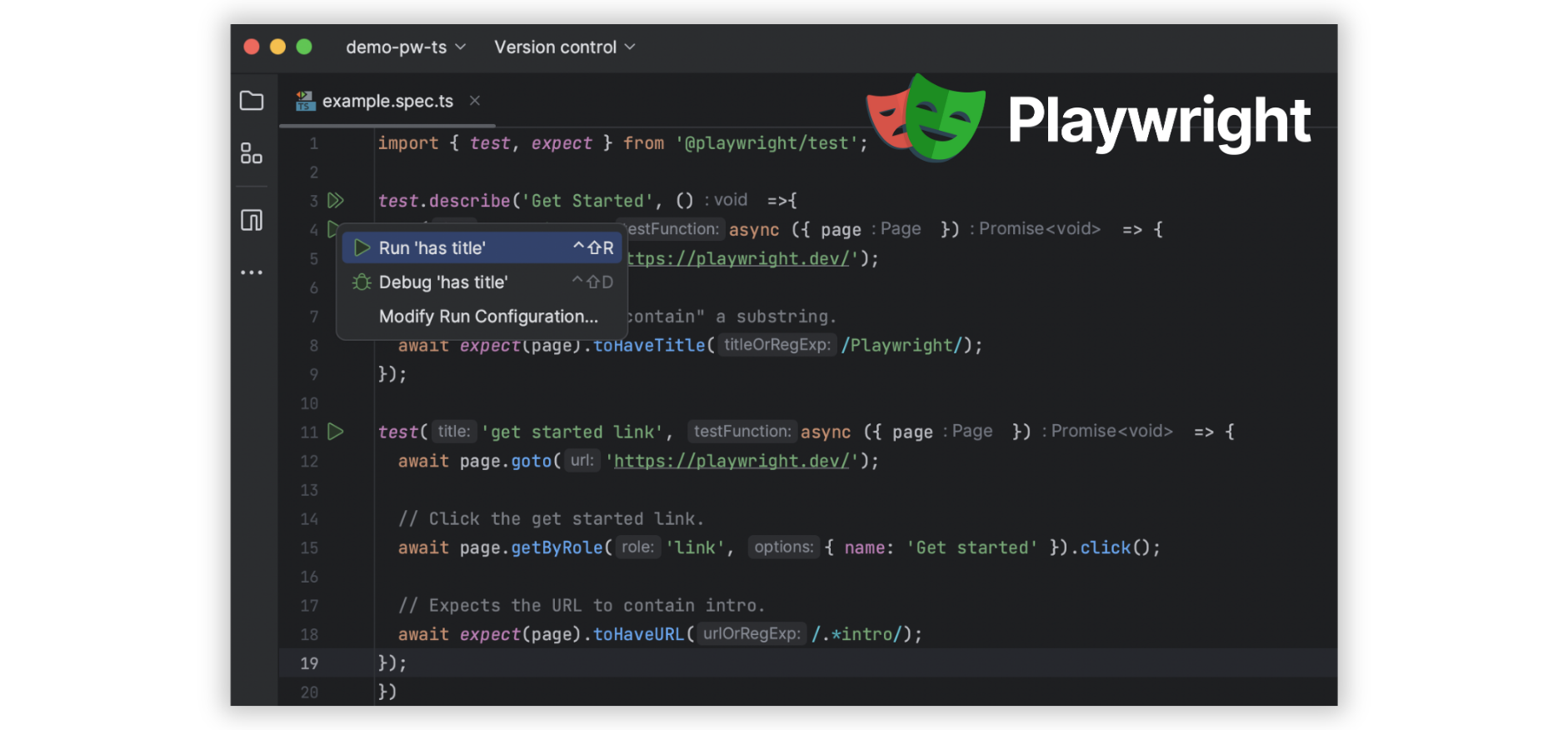 Features
Features
- Contexts: Can create isolated browser sessions; hence parallel testing is possible.
- Cross-browser supported: Works across Chromium, Firefox, and WebKit.
- Auto-Wait: Automatically waits for the elements to become ready to perform actions.
- Strong APIs: Feature-rich APIs in interactions, navigation, and assertions on elements interacting with pages.
- Supported languages: JavaScript, Python, .NET, Java.
Discover QAlified’s new Playwright Template.
3. JMeter
JMeter is the most frequently used web application performance and load-testing tool. It is an open-source software designed to measure performance and test function behavior. JMeter helps you simulate heavy loads on servers, groups of servers, networks, or objects. It can test their strength or analyze general performance under such heavy load types.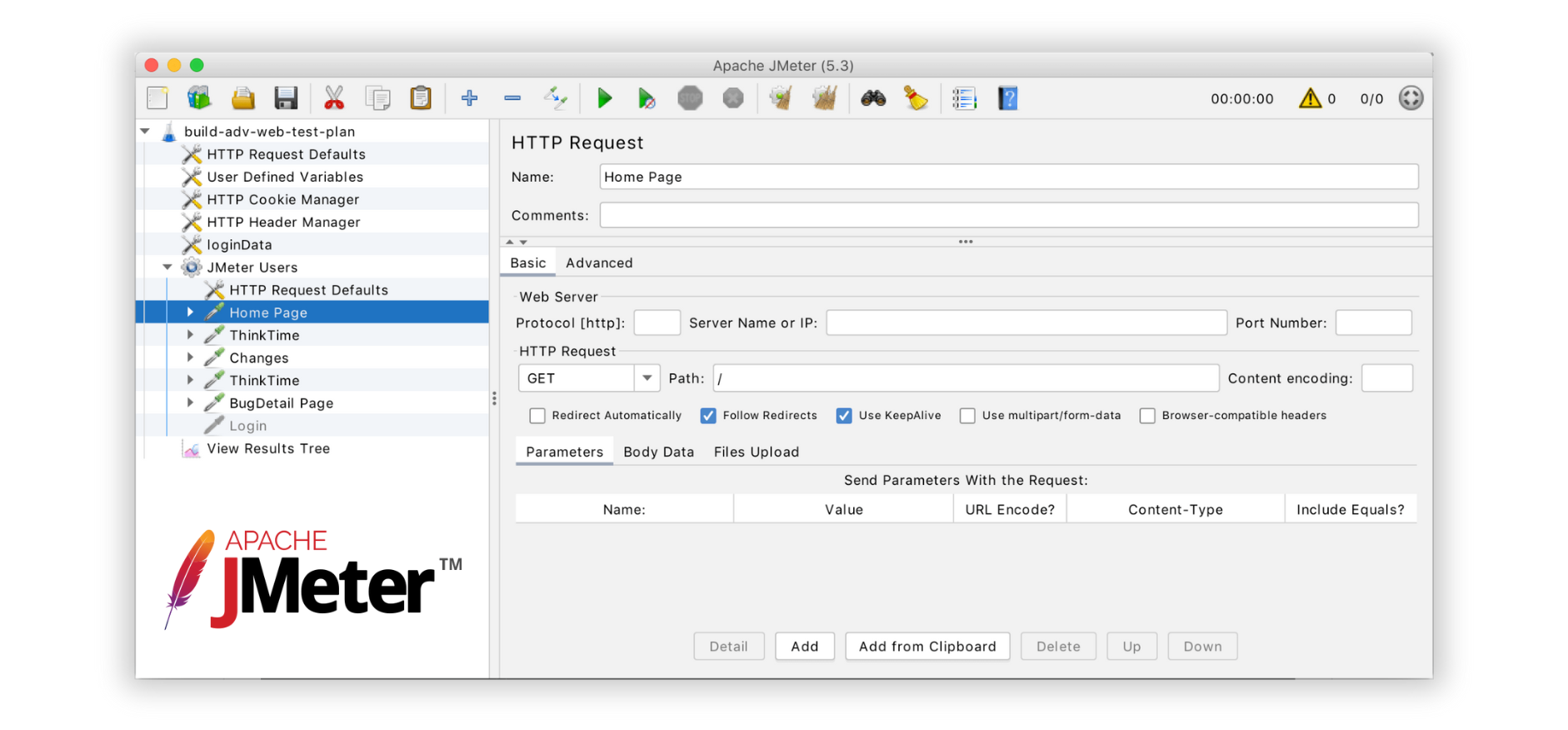 Features
Features
- Use protocols: HTTP, HTTPS, FTP, JDBC, LDAP, SOAP, JMS, among others.
- Thread Groups: They emulate the simulated behavior for concurrent threads from multiple users.
- Test Plan: It helps create a flexible test plan using samplers, logic controllers, listeners, and timers.
- Load Testing: This form of performance test defines how the system will perform under the load applied by the application itself.
Discover how to conduct distributed performance testing with JMeter in our complete guide.
4. SoapUI
SoapUI empowers users to perform automated functional, regression, compliance, and load testing against various Web APIs. SoapUI provides support for all types of standards, protocols, and technologies. It contributes to ensure the possibility of comprehensive testing of any form of API. Users can easily utilize its functionalities because it furnishes a user-friendly interface for both technical and non-technical users.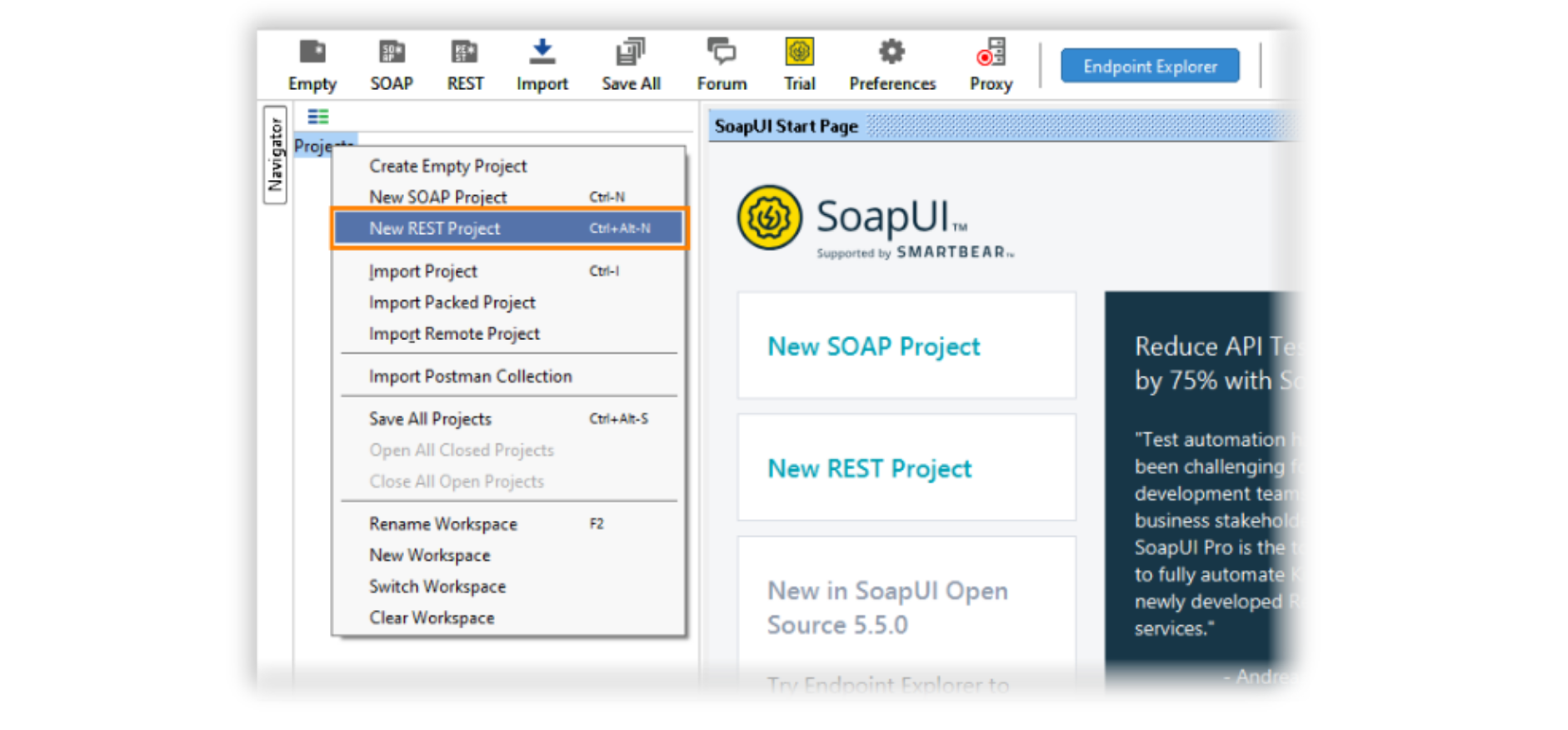 Features
Features
- SOAP and REST Testing Support: Complete support for both SOAP and RESTful web services.
- Service Simulation: Mock services could be modeled to be tested in case the actual services are not available.
- Data-Driven Testing: Use external data sources like Excel, XML, and databases for test data.
- Security Testing: Detection of vulnerabilities by scanning the security against XSS, SQL Injection, and more.
- Automated Testing: Automation testing execution and custom logic are Groovy-scripted.
- Integration: This tool is very compatible with CI/CD tools such as Jenkins and Maven.
5. Jira
Jira is a project management tool with some powerful testing features such as issue tracking, reports, and task boards. It can be easily integrated with most of the test automation tools. This speeds up the streamlined testing process and further speeds up the process of increasing productivity.
This type of integration allows Jira to integrate with automation test tools such as Selenium, JUnit, and TestNG. It accelerates testing that automates and manages tests relatively faster. This enables the normalizing and tracking of changes and ensures testing is kept on pace with the lifecycle of development.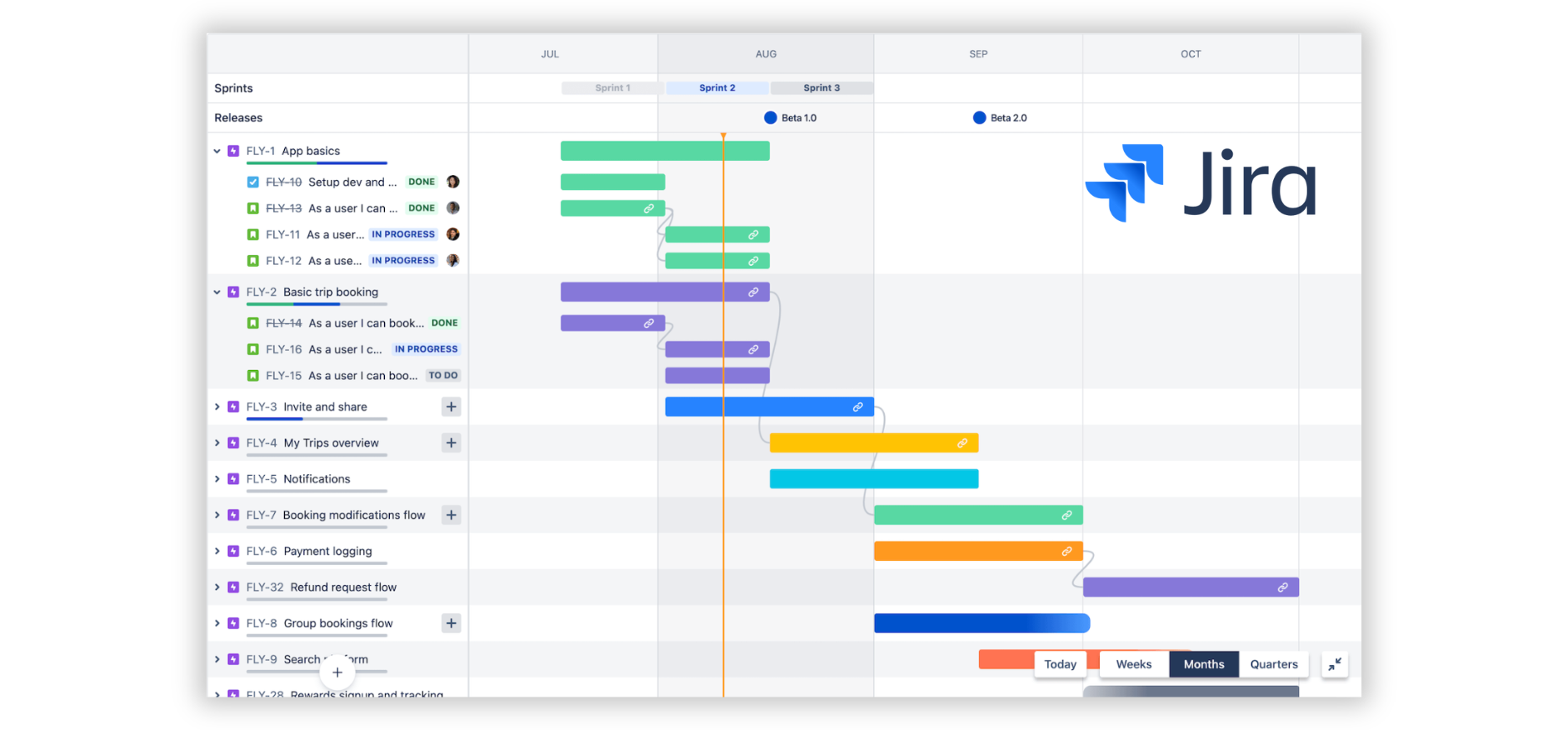 Features
Features
- Custom workflows: Create and customize workflows to suit the project’s requirements.
- Agile Boards Support: The agile project management technique supports Scrum and Kanban boards.
- Standalone Mode: This can run even without the Selenium server; it runs directly with the browser.
- Framework support: BDD is done using Mocha, Jasmine, and C.
- Services: Pre-built services for Selenium Grid, Appium, and Docker.
- Visual Regression: Works with your current visual regression testing tools.
6. Docker
Docker is an open-source platform used for automatically deploying applications within lightweight, portable containers. It provides structured and isolated environments where tests are run similarly across all development stages.
Docker containers encapsulate everything in them. So there will never be any discrepancy between the setup a development environment has and a production setup. Moreover, the capability of Docker ensures truly seamless CI/CD capabilities in continuous testing and deployment.  Features
Features
- Containerization: Packaging applications and their dependencies into containers.
- Docker Compose: Explain multi-container applications with compose files.
- Image management: Adding image layers, storing images, and distributing them.
- Networking: Advanced networking features through custom networks and service discovery.
7. GitHub
GitHub is one of the most recognized tools for version control and collaboration. Besides this version control, GitHub itself brings full automation testing functionality using GitHub Actions. Here, developers and testers can automate thousands of repeatable tasks related to testing, building, and deploying your applications.
You then define, in YAML syntax, a sequence of steps and conditions under which you want your tests to be executed. In simple words, under the needs of one’s project, one can carry out the process of automation.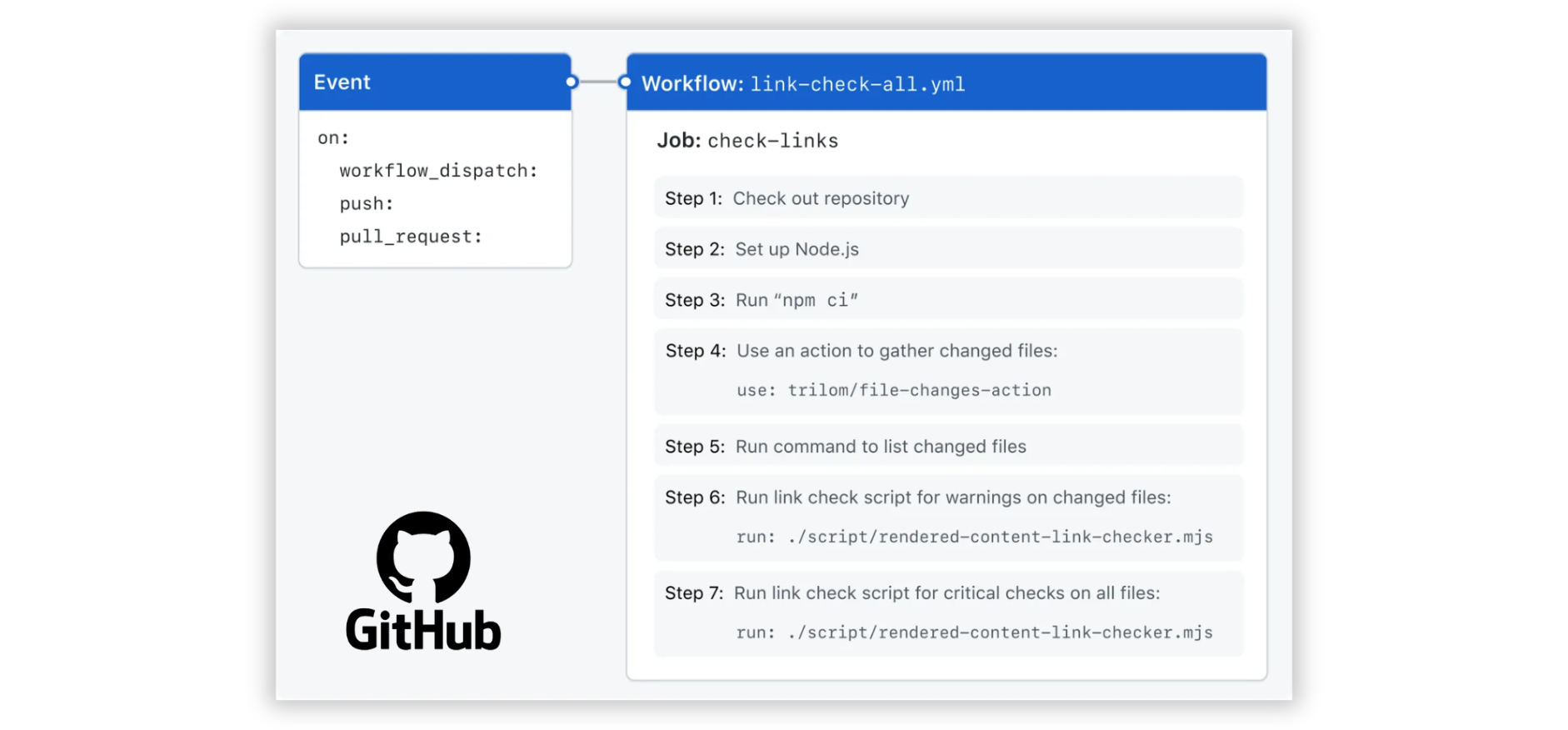 Features
Features
- GitHub Actions: Built-in CI/CD pipelines to test and deploy.
- Repositories: Unlimited collaborators on public and private repositories.
- Security: Offers built-in advanced security features, including Dependabot, code scanning, and secret management.
- Integrations: Strong integrations with third-party services and tools.
Visit our GitHub profile and stay updated with our resources.
8. Postman
Postman is an engaging and automatic API testing tool. It provides a user-friendly interface for creating, verifying, parametrization, and analysis for testing requests. It enables recurrent, reliable tests to be automated and utilized in various scenarios.
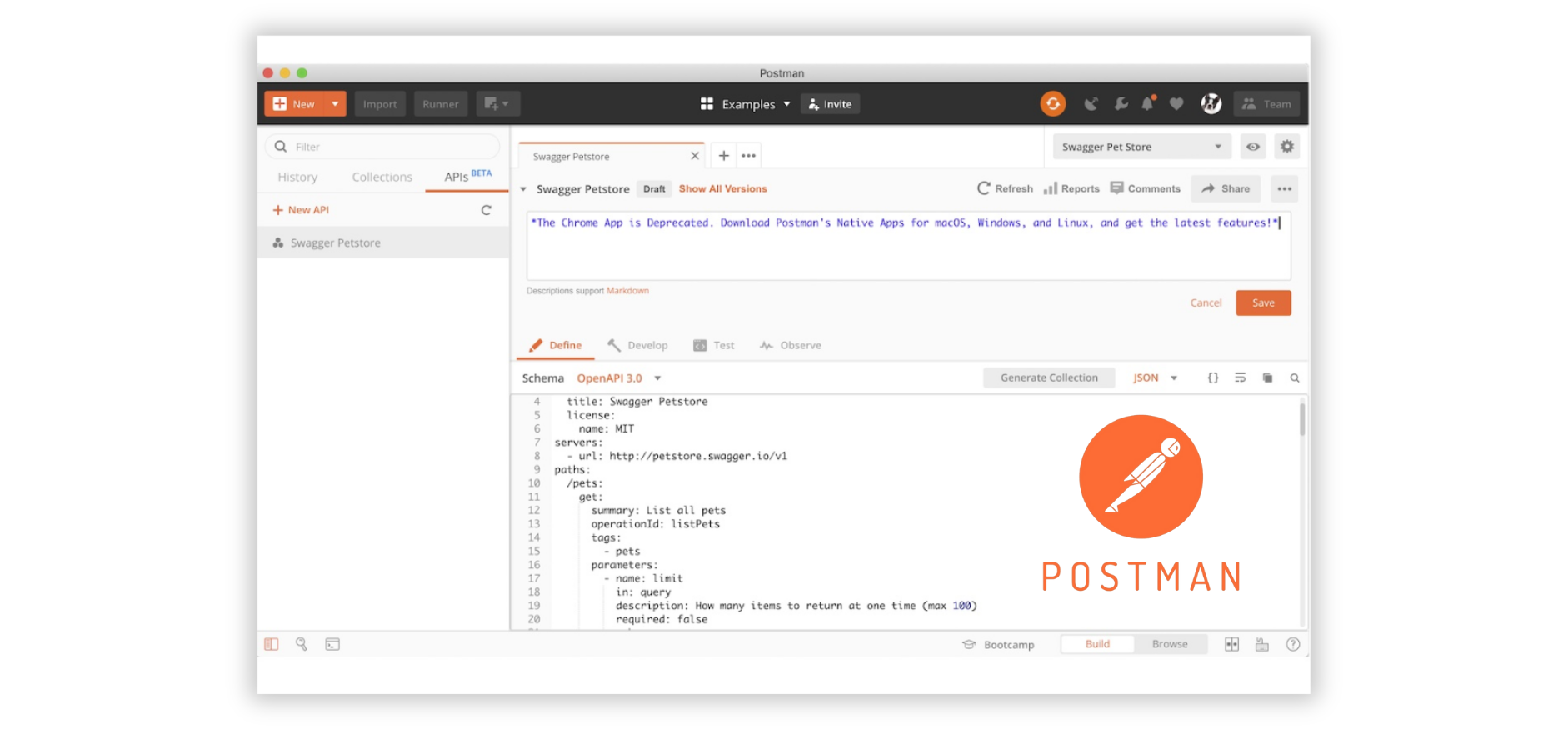 Features
Features
- It provides a range of built-in libraries in the Test and Pre-request scripts.
- Provide robust support for GraphQL.
- Storage of data for multiple tests.
Learn How to Use Postman For API Testing.
9. Jenkins
Jenkins is an open-source automation server, which allows engineering teams to automate the entire process of software development. It starts from building and testing to the deployment of applications. It is highly extensible, with hundreds of plugins supporting the ecosystem of tools around continuous integration and delivery (CI/CD).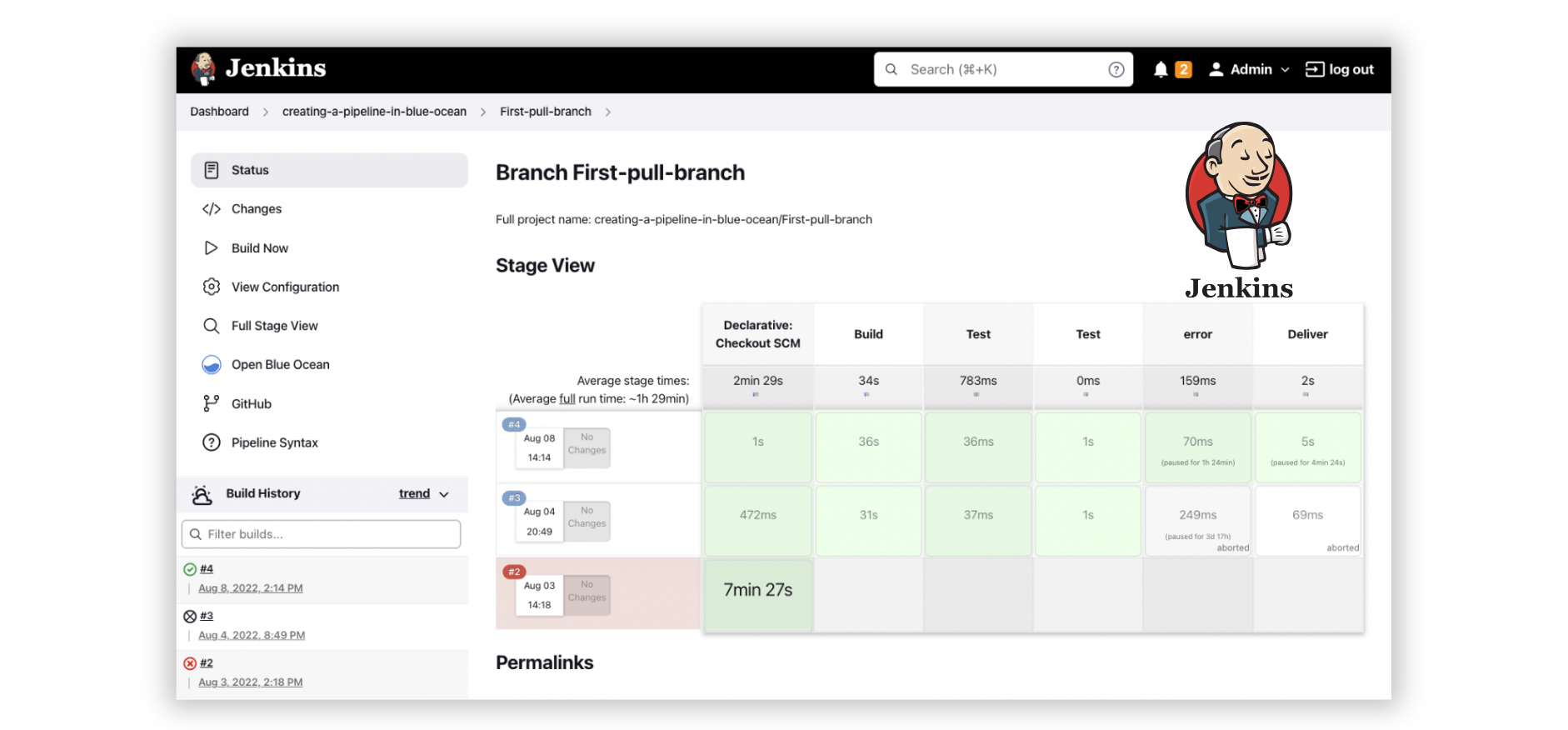 Features
Features
- Distributed Builds: Builds are run across different nodes to balance the load.
- Highly Flexible: Kept flexible with custom plugins and integrations.
- Notifications: Seamlessly integrated with email and Slack, along with any other notification systems.
- Source Control Integration: Compatible with Git, SVN, Mercurial, etc.
- Create triggers: SCM polling, webhooks, and time-based builds.
10. WebDriverIO
WebDriverIO (WDIO) is a popular, free, open-source automation testing framework developed for Node.js. It allows developers and testers to easily interact with browsers in an automated way and execute tests automatically through multi-browser and multi-device testing.
WDIO makes creating and running Selenium tests easy so you can develop stable and maintainable test suites easily and fairly fast.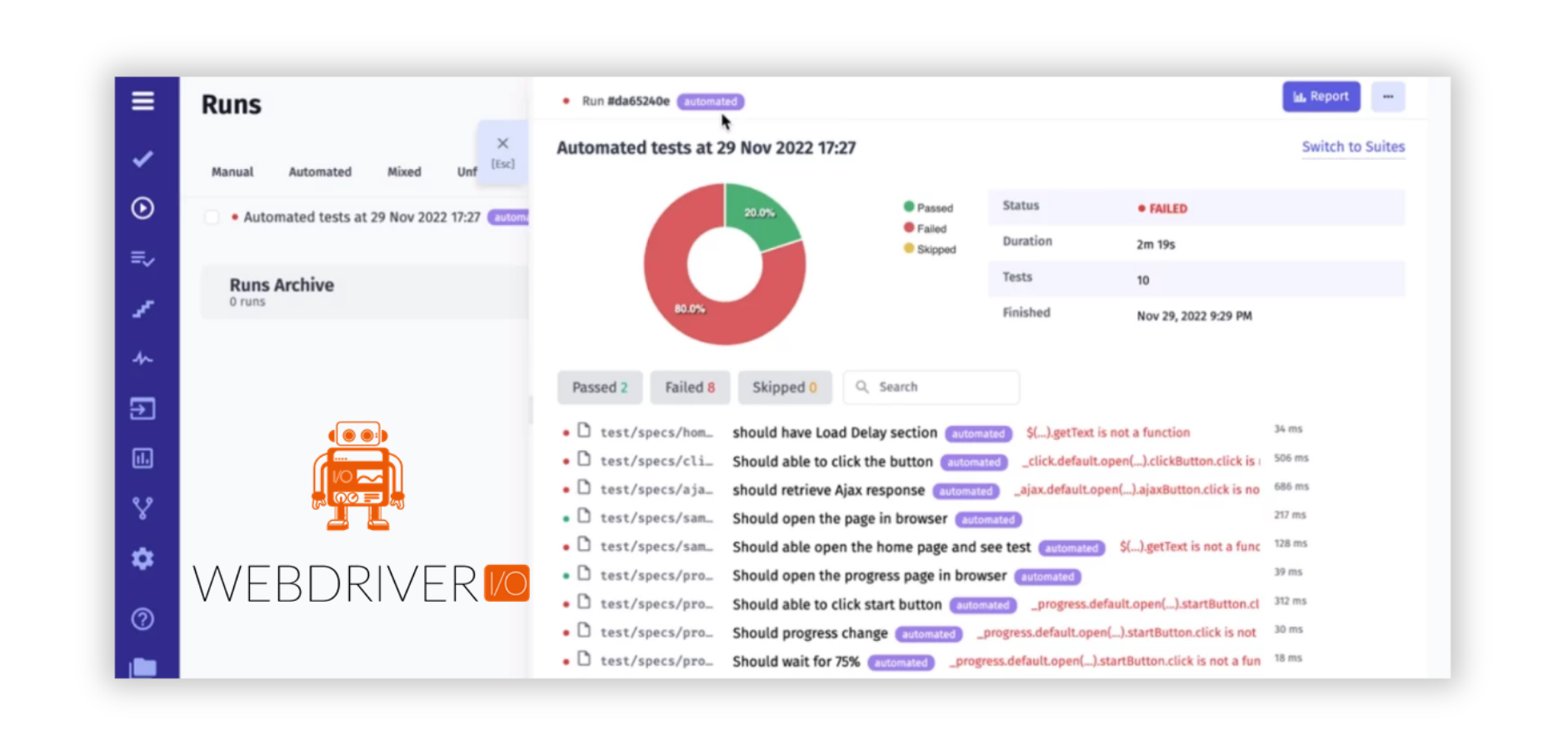 Features
Features
- Cross-browser testing: works on Chrome, Firefox, Safari, and Edge.
- Framework Integration: Seamlessly integrated with Mocha, Jasmine, and Cucumber to support more flexible test writing.
- Automatic Synchronization: It automatically waits for an element to be available before finally deriving the action.
- Parallel Execution: It enables parallel execution of test cases.Visual Regression Testing: Integrates with any visual regression tool to ensure UI consistency.
- CI/CD Integration: Integrates very easily with most CI/CD pipelines, through which it automatically performs tests.
- Custom Commands: Write and control your custom commands to extend the functionalities of WebDriverIO.
- API Testing: API testing, independently and hand in hand with UI testing, broadens the coverage relating to testers.
Conclusion
These tools ensure the efficiency and quality of software development by offering various functionalities. You can perform QA testing across web applications, API testing, performance assessment, and load testing by incorporating these tools in your SDLC. This can enhance productivity and improve the quality standards in the software development industry.
Utilize our top 10 tools for 2024 to take control of the software testing industry. Streamline processes, increase productivity, and maintain your lead in the ever-changing tech industry.
We have experience and trained personnel in the use of all these tools. If you would like to have advice and implementation of software testing in any of your projects, contact us.




